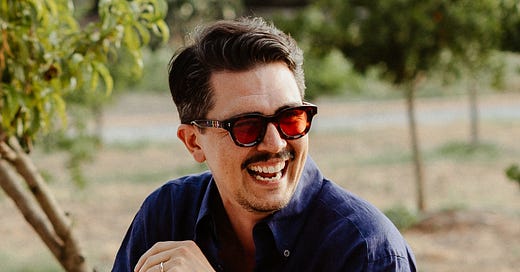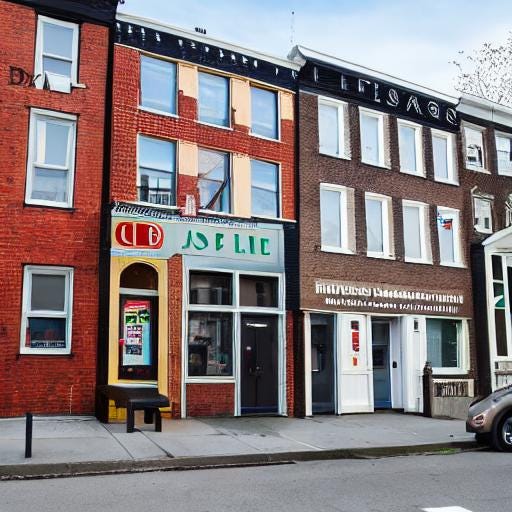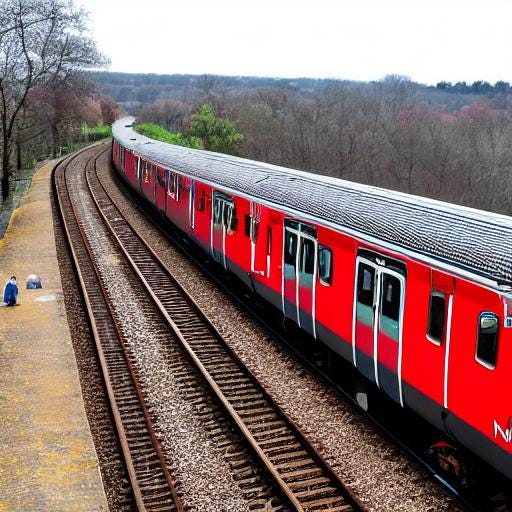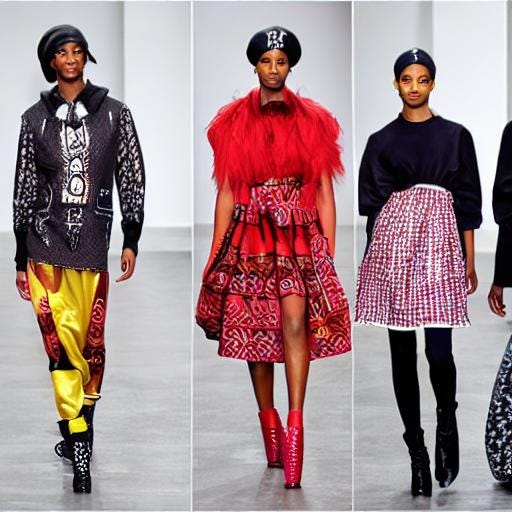Welcome to TR Pen Pals, a recurring feature in which I correspond with luminaries from the world of arts and letters.
I always look forward to T.M. Brown’s byline — whether it’s his investigative reporting or pithy first-person dispatches, his journalism sifts the past to better contextualize contemporary art. His music writing eschews the dictates of trend reporting, centering discrete scenes and phenomena with appreciative curiosity. I’m struck by his work’s clear and modest purpose, its pursuit of history and anecdata heedless of publishing-world caprices.
Teddy’s Substack Is It Supposed to Look Like That? poses weekly thought experiments, with short-form meditations on consumerism and fashion. He recently took home an Excellence in Multimedia Award from the NLGJA for his work in The New York Times. His latest personal essay, published last week on Defector, unpacks personal and societal crisis from the scenes of Brooklyn’s public tennis courts.
Teddy seems like someone who’s figured things out — as far as “writing cool articles for cool outlets” goes — so I wanted to pick his brain. In this installment of TR Pen Pals, we discuss writing as community, freelance success metrics, and washing up in New York.
Pete: So, I feel like I've been reading and enjoying your bylined work for many years now, and I think it's cool how you've written for such a broad range of outlets while maintaining a low profile/not being annoying online. Does that come naturally, or was there a conscious decision to reject the whole writer-as-influencer model? Do you feel that's opened or closed any doors for you as a freelancer?
Teddy: It’s funny, there is a really big part of me that wants a higher profile but since I didn’t come up through the traditional media routes it feels like a losing battle. I do often wonder how much actual work for “quality” outlets gets green-lit because of public personas though, and I think we maybe overestimate how much a follower count influences whether you get a “yes” from Harper’s or The New Yorker or whatever. I’m more envious of writers who have cultivated an online audience because they seem to have a better audience with which to send ideas back and forth. (A wishful conceptual model of Twitter, of course. I remember having to log off for an entire day one time because someone was moderately mean to me about a newsletter I wrote.)
I'm mostly ambivalent about that lack of positioning now, though. People who nailed the influencer-writer axes tend to be a lot better at the former part of the gig, triangulating their work to speak to human banalities in an equally banal language. That doesn’t mean I don’t want to be appreciated or have my work validated by people — I very much want both of those things — but I do think we tend to equate quality with success.
I get roasted by my friends for saying this, but popular culture is bad because it’s popular. I know that sounds like the Hater’s Oath or whatever, but what I mean by that is generally when a piece of content (shudder) is widely successful, it’s because it has been calibrated to appeal to a swath so wide that there can’t be a cohesive understanding of quality. There are major and minor notes to that, of course, because I love The Godfather and Olivia Rodrigo, but I do think we sometimes get pulled into cultural tides that deaden our ability to decipher whether something is actually good or not. My go-to recent example here is the TV show The Bear, which was laser-targeted at my sensibilities and was also mediocre at best. Did you actually like The Bear or was the discourse around it so familiar that it felt like you had always liked it?
I know that sounds incredibly pretentious and annoying, and it is! But this is all a long way of saying that the same thing happened when we decided to draft a new class of contemporary writers-as-influencers. Popularity is much more about affirming rather than challenging sensibilities, which is why so many of our generation’s most famous writers feel as though they’re having old conversations with a new vernacular. I still think the most interesting work is happening way outside the cone of social media. As much as things like Twitter have been an influence on my own community and perspective, I think they’re a collective net-negative in how we approach creative work, because you end up pre-digesting your own writing as you try and figure out what the response on a given platform will be. We already have that very loud critic that lives in our own brains, now we’ve externalized it into a million tiny critics yelling at you about something you wrote on the bird app before you’ve even put pen to paper.
Pete: I relate to that — I gave up on The Bear thirty minutes in. It’s clearly a Well-Made And Well-Acted Show, but its whole value-prop seems to be its placement within the context of like, Uncut Gems-meets-Succession-meets-The Menu. I haven’t even seen those shows, but you can tell they were eager to court that buzzy high-middlebrow prestige. It bums me out!
It seems like a lot of your reporting advances from a place of genuine wonder: What's the deal with these Fire Island tapes? Where did techno come from? What the heck is a catalytic converter, anyway? (Thanks for that last one, by the way.) I have to imagine these inquiries take a lot of unforeseen turns. How do you approach such open-ended pieces? Is it hard to convince editors of your vision?
Teddy: It’s only in the last year or so that I’ve realized “community” is what interests me as a writer. I moved quite a lot as a kid — about a dozen times before I was 13 — so I was constantly the new kid trying to figure out how to ingratiate myself with different groups. Both the mixtape and the techno piece came out of that realization, i.e. I was not part of either of these communities, and I wanted to explore what made them cohesive and generative. (Smaller stories like those on catalytic converters or rats came out of that journalistic instinct of asking, “Is this something?”)
I should say that this really all started with the Fire Island piece, which I still count as the most important story I’ve ever worked on. When I pitched it, I went to the Real Estate desk (long story about why) thinking it might be a small, 800-word human interest piece. My editor there, Nikita Stewart (who is the best editor I’ve ever worked with), had come from a long career covering harder news topics, and brought this incredible perspective to a section that was traditionally about which billionaire was selling their Hamptons house, or the weekly hate-read The Hunt. Nikita — and I have started to use this positioning for everything — instead wanted to use real estate as a lens through which to see the world, which is how you get incredible pieces of work like the Barbie Dreamhouse retrospective, or investigations into how race plays a factor in home appraisals. That’s become my driving philosophy for a lot of my more ambitious stories: How does this small thing explain a much bigger thing?
Anyway, I credit her with giving the story the amount of latitude and oxygen it needed. I think as freelancers we’re often forced to take what we can get, because permission to advocate comes with a familiarity we often don’t get to cultivate. So when you have a really good editor like Nikita, you do whatever you can to work with them again.
The techno story is actually a decent example of what can happen when you do advocate for a story to have a wider berth. It started as a 2000-word essay that my editor was lukewarm about, so when I said, “well, how about I actually go to Frankfurt and Detroit” to flesh out the story, he eventually agreed and we ended up with something that was a lot more whole.
Pete: I’ve often returned to your piece about bartending in Alphabet City — partly because it's the kind of unabashed bloggy dispatch that disappeared shortly thereafter, but mostly because there's so. much. bad writing about the East Village and yours felt romantic and exasperated in a way I recognized. Everyone should be cynical about New York, but might as well be moony about it while you can!
And I was happy to read your recent piece on Little Tokyo, because it plumbed another half-hidden corner of Manhattan I didn't know much about. This is, among other things, a Substack About New York, and having read so much of your writing on the city I'm curious: Where are you in your New York experience? Are you still finding new corners and communities that make you feel inspired?
Teddy: I’ve been here for 13 years now, but I actually think a much more important part of my New York City experience was when I was living in Greenwich, CT as a middle schooler without much in the way of supervision. We used to hop the Metro North and hide in the bathroom to avoid paying for tickets (a tactic that will be familiar to anyone who grew up in the area) and go hang out in St. Mark’s. I got my first tattoo as a 13-year-old on Macdougal, would go to Search & Destroy and Yellow Rat Bastard.
I say all that to get back to the concept of community. It was exciting to be a kid in New York because we were doing exciting things as a group of friends. Shit like getting rolled for a fake ID in the West 4th McDonald’s felt like this insane departure from my life, and I’m grateful that I had people around me that were getting into the same trouble.
Sadly, I’ve sort of settled into a hamster wheel here now. I do think COVID played a role in creating this weird cultural/generational separation point; I know my own community of people in music were scattered to the wind or at least knocked off their axis, and my own appetite for going out went with them.
There are of course really interesting things happening in NYC, there always are. I think when people talk about NYC being over, it’s more that their own limited pockets of reference are disappearing and attempting to re-entrench in another sphere is really fucking hard. But again, I’m more convinced that the interesting things happening here are way outside of the usual spotlights, even as we do seem to be hitting an actual event horizon of affordability.
The last thing I’ll say here is that, as optimistic as I am about there still being a cultural ferment in New York, I do still feel like things are genuinely on the precipice of some Very Bad Shit. It’s human nature to be convinced you’re living in the end times — it makes you feel important and probably helps contextualize your mortality — but yeah, America feels very close to the end of something.
Pete: We’re on similar timelines. I grew up in New Haven County — I know those Metro North bathrooms intimately — and there was something very alluring about having all that at arm’s reach, while also feeling like I could only tap the surface. This is surely reductive, but I attribute the experiential ickiness I currently feel in New York directly to the affordability crisis. Why is the city becoming less diverse? The rent. Why is Canal Street a safe space for edgelords? The rent. Why aren’t millennials writing novels? Again, the rent.
I don't remember precisely, but I think I may have first encountered your writing via the Study Hall network. Pretty wild how that all shook out, no? I gather arts communities are a deep passion of yours — what sort of community do you find yourself craving as a writer in New York these days?
Teddy: God this question is so thoughtful. Study Hall was wonderful and exactly what I needed at the time when I was just starting to figure out my life as a writer. (I had been a city planner and worked in tech up until, like, 2017.) I have a very close set of friends from the early days of SH, but I think it eventually grew without any understanding of what it wanted to be. (Understandably so, Enav and Kyle are both incredibly talented and had their own careers and ambitions.)
I’ll be bitchy for a second: I still get the digest emails and in reading through them I’m astounded at how little effort people seem to put into things. There is a large volume of people saying “do you have this person’s email address?” or “can you do all this work for me?” and they turn me into a boomer every time I read them.
One thing about starting my career late and never having gone to school for this is that I don’t have a ton of fellow travelers that I can moan in a group chat with. I’ve started making more writer friends — via Twitter, which seems crazy — and it’s been really rewarding just to have folks to talk to, especially because I’m realizing writers all seem to have the same anxieties and complaints. But yes, I find myself envious of people who interned at, like, The Awl or Gawker together because that seems to be a community of folks who keep each other sharp.
Community as a general concept is really vital to me, it’s the water I want to swim in. So I end up trying to build or partake in a lot of different ones which has been a really enriching part of my life.
Pete: Yeah, I feel like we missed the Gawker/Awl heyday by a few years, and that network had become diffuse by the time I was freelancing seriously. It was like, you could cold-pitch the same half-dozen Vice editors as writers in L.A. and Omaha. Study Hall gave me a lot of direction, and it provided glimpses at other ways of hacking it. Then its growth seemed to coincide with pretty rapid disinvestment — not to be gatekeep-y, but it felt warmer when it was small. 2010s Media in a nutshell, I guess.
As I write it is, evidently, New York Fashion Week. I was going to say something along the lines of "I'm not really into clothes like that," but that's not true — I like what I like — and as I thought about it, I realized I felt that way because so much of the fashion media I encounter is just patently not for me. I'm extrapolating here, but I imagine you must feel some type of way about menswear writing, or you wouldn't be correcting the record with your new Substack! Any thoughts on the state of fashion writing? What would you like to see more or less of?
Teddy: I think we’re in a really interesting place with menswear culture. That we even have a middlebrow POV on the topic a la Throwing Fits is incredible, and while I don’t find the podcast to my taste I also appreciate that it exists and that there’s a general interest in the finer points of clothing. Avery Trufelman is doing incredible, vital work on clothing as cultural objects with Articles of Interest, and luminaries like Hua Hsu are able to go long on J. Crew in The New Yorker. (To say nothing of their resident fashion critic Rachel Syme, whose work is always exceptional.)
I also think one of the unintentional benefits of our evolving conversation around gender is that caring about clothing and fashion isn’t coded as feminine anymore — or more importantly, that something being coded as feminine is no longer stigmatized for men. (And I should say that I use “men” as shorthand for men like me: straight masc dudes.) I now find myself dying to buy a Thom Browne skirt in heavy grey wool, which is something I don’t think culturally I would have considered ok before a few years ago. Bode illustrates that progress in miniature; there’s a great line in Brock Colyar’s NY Mag profile of the brand where they quote the wonderful fashion critic Lauren Sherman as saying “[Wearing Bode] says, ‘You can wear a lace shirt and still fuck girls.’” I think that’s a beautiful meeting of the feminine and masculine, and I’m really glad menswear has started exploring that intersection.







